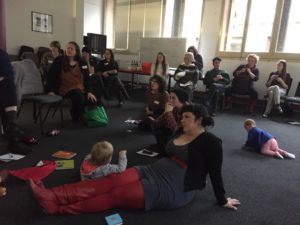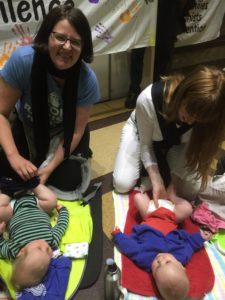Building a bigger, better movement – Barriers to participation
The climate movement has a problem. If you were to put a stereotype on it, it’s white, middle class, university educated, and inner city. That was an easy fit a decade ago. Now, less so, but we still have a long way to go. The other issue is that it is hard to define what the climate movement is. If you included everyone who cared about the climate it would be much bigger, but the language used has often been exclusive. Whilst there have been big leaps in recent years, and leadership shown by young aboriginal people and pacific islanders, the collective “We” still needs to improve on both how we work, and how we communicate.

We ran a series of trainings for grassroots climate activists in the last six months, and asked them to think through concepts of what a climate JUSTICE movement looked like to them, as well as barriers to participation. We will be writing a short series on some ideas that were crowd-sourced by the group, as to how to deepen and broaden our connections in working to protect country and climate.
Let’s talk about the generation gap.
Despite the moaning of the boomer generation, there are many awesome young people involved in the climate movement, though many of the young people we speak with still lament that it is hard to get the attention of their fellow students. In part because there are so many extra pressures on young people today – unaffordable housing, insecure casual jobs and high costs of education combine to make it very difficult to give extra time to activism on top of working to cover rent and food, whilst studying. So, how bout we show a little gratitude to the young people working to clean up the messes of the wealthier generations that have come before?
So we do have younger folk in the movement, and plenty of boomers – often whose wealth, and ability to retire due to this accumulation, have more time, as well as grand-children to dote on and worry about. And many of them are tireless – so lets also give a shout out to the knitting nana’s, and people working in the Climate Action Groups and Stop Adani groups, and people like Bill Ryan – our favourite role model for aging disgracefully.
Where is the middle?
But the middle is missing. There are comparatively few people from 25-50 involved in the movement. They may be working hard in careers, or parenting. For those who are time poor, they may have high level expertise (that needs voluntary support coordination to make accessible) or money to donate. In the case of parents, they may have some time, but our movement is not well set up to support their participation. And so we miss out, on the richness of experience of these folks, and having more children in and around the movement working for their future.
Here are some ideas gathered for family friendly organising, making meetings and activism more welcoming to parents.
Family Friendly Meetings
- Meeting times (not always at the “witching hour” 6/7pm food and bath time) – alternate weekends with weekday evenings if needed
- Childcare – needs to be seen as a collective responsibility
- Buddy system / bridges – having a non-parent buddy to ensure parents are kept in the loop
- Parents co-organising together, and having meetings at parents houses if it suits them (but not leaving clean up for them)
- Call in – always offer phone in options. Sensitive info can now be shared more easily with encrypted comms
- Actions:
- Designed by kids, for kids
- Let parents know children are welcome
- Provide kids space/activity/action
- Debrief support
- Recognise that the primary caregiver is still a frontline activist (one at home with kids)
- Consider drugs and alcohol in spaces (time, designated areas/boundaries)
Family Friendly Venues
- Is it full of hazards or is it child friendly?
- Scan the room at child’s eye view and see what could be dangerous.
- Is there a break out room, or another space that is in sight that parents can keep half an eye on kids?
- Can you bring some toys? Or if not, at least some textas and paper.
- Providing food and snacks is good for everyone and especially kids
We work on a shoe string, and so to provide professional child care is often out of our budget. But we have done so when we can afford to, or have grants to subsidise training. Many other organisations do not have this excuse and we’d love to see family friendly events normalised.
Other Family Friendly Considerations

- Later start times. We start at 930am on week days to allow for school drop off.
- Advertise that our events are child friendly, even if we can’t afford child care. Let people know to contact us if they would like to discuss. Pay a younger activist a stipend with a working with children’s check if they are willing to get free training for some of the event.
- Specifically welcome children and parents. Ask parents to share if there is anything that would support them to stay focused in the meeting, and gently remind the group that child care is a community responsibility – if you see a kid crawl towards a hazard and you are closest, jump in.
- Acknowledge and welcome breast feeding women. Accommodate women who need to pump. Don’t make it a big deal, just normalise it with the group.
- Build our resilience for chaotic meetings. It’s a skill that is great to build in general – particularly if you are involved in frontline work. When things are chaotic, it’s useful to be able to focus. It is also important that parents don’t feel guilty. If you are struggling to focus with a kid being active in the corner, just acknowledge it, smile, and keep going. There is no need for parents to feel like they should apologise. On the flip side, if a child is being really loud and the parent feels they have to leave as they see that the group can’t focus and their child needs attention, ask how to support them to stay involved or to catch up.
- Include children in some way, if they attend. Whether that is to simply encourage them to share ideas without talking down to them, or modifying exercises so children can participate.
Additional ideas crowd-sourced included:
- Flexible deadlines
- Non-residential training series, or shorter ones – with child care options for young children, and thinking about accommodating the parents of school age children
People who work for professional NGO’s also asked for consideration for:
- Challenges of returning from maternity leave, allowing affordable training for re-entering parents
- A specific acknowledgement of a family friendly workplace
- Flexi time
- To provide alternatives to residential accommodation events. This means more cost for employers, providing child care as needed. It also requires building team building and “bonding” into daily sessions, rather than making the overnight stays necessary.
We’ve also participated in these discussions with Melbourne Campaigners Network and there is a great write up by Liz Shield on Plan to Thrive here.
Doing better

Groups we need to work better with are people of colour, migrant communities and aboriginal communities. Many of them tend to have a much healthier attitude to including children in communities and meeting. It makes sense to learn from these folks and make it a win-win-win situaton for broadening the movement.
We also started to plot for how parents could be involved in supporting actions remotely – as part of a Home Office Support Teams (HOST) program. We would mentor and support parents to develop skills in social and traditional media to directly support climate actions. More to come on that!
Because it will take everyone to change everything, and what more motivated group of people could there possibly be than parents who are concerned for the future their child would be living in?
Thanks to Aleesha, Shona, Caz, Alana, Ewan, Anne, Kara, Eliza, Justin, Morgan for their input and scribing.

